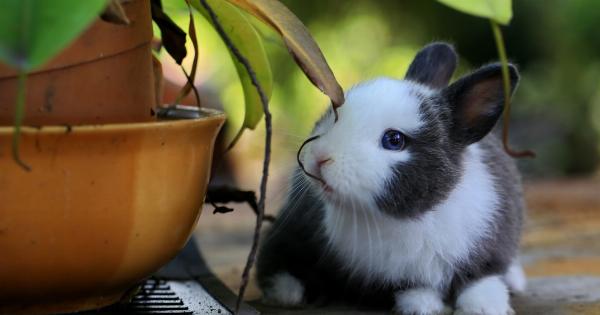Easter is a time for celebration, family gatherings, and indulging in delicious treats. While we may enjoy the sweet and savory delights associated with this holiday, it is important to consider the impact these goodies can have on our furry friends.
Many of the traditional Easter treats, such as chocolate eggs, hot cross buns, and other sugary delights, can lead to digestive problems in pets if consumed in large quantities or in inappropriate forms. In this article, we will explore the potential dangers of Easter goodies and how to keep our beloved pets safe during this festive season.
The Danger of Chocolate
One of the most common Easter goodies that pose a threat to pets is chocolate. Chocolate contains a compound called theobromine which is toxic to dogs and cats.
While humans can easily metabolize theobromine, our pets lack the necessary enzyme to break it down. When ingested, theobromine can cause symptoms such as vomiting, diarrhea, rapid breathing, increased heart rate, and in severe cases, seizures or even death.
It is important to keep chocolate treats safely stored away from the reach of curious pets. Remember that even small amounts of chocolate can be harmful, so it’s best to avoid sharing your Easter treats with your furry friends.
If you suspect your pet has ingested chocolate, contact your veterinarian immediately for guidance.
Xylitol in Sugar-Free Sweets
Sugar-free sweets and candies are another common sight during Easter. These treats often contain an artificial sweetener called Xylitol, which is highly toxic to dogs.
Xylitol can lead to a rapid release of insulin in dogs, causing a dangerous drop in blood sugar levels. Symptoms of Xylitol poisoning in dogs include vomiting, loss of coordination, seizures, and in severe cases, liver failure.
If you have sugar-free sweets in your home, make sure they are kept securely out of reach from your pets.
Even a small amount of Xylitol can have serious consequences, so it’s crucial to be vigilant and avoid accidental ingestion by your furry friends.
The Risks of Raisins and Grapes
Traditionally, hot cross buns are a popular Easter treat enjoyed by many. However, these delicious buns are often made with raisins or currants, which can be highly toxic to dogs.
Even a small amount of raisins or grapes can trigger kidney failure in dogs, leading to symptoms such as vomiting, diarrhea, abdominal pain, and decreased urine production.
If you plan on baking or purchasing hot cross buns, ensure they are stored safely away from your pets and dispose of any dropped raisins or grapes immediately. If you suspect your dog has ingested raisins or grapes, seek immediate veterinary attention.
The Problem with Easter Lilies
As we decorate our homes with colorful flowers and plants, Easter lilies are a popular choice due to their beauty and symbolism. However, these flowers can be extremely toxic to cats.
Ingesting even a small amount of Easter lily leaves, flowers, or pollen can cause severe kidney damage in cats, leading to dehydration, loss of appetite, vomiting, and in some cases, death.
If you have cats in your household, it’s best to avoid having Easter lilies within their reach.
If you suspect your cat has come into contact with any part of an Easter lily, seek immediate veterinary care as time is of the essence when it comes to treating lily poisoning in cats.
Practicing Pet-Friendly Easter Celebrations
While it may seem challenging to navigate the potential dangers associated with Easter goodies, there are several ways you can ensure a safe and pet-friendly celebration:.
1. Keep Treats Securely Stored
Store all Easter goodies in a secure location where your pets cannot access them. This includes chocolates, sugar-free sweets, hot cross buns, and any other items that may pose a threat to their health.
Make sure to explain the importance of this to young children who may not understand the dangers posed to their furry friends.
2. Educate Your Guests
If you’re hosting Easter celebrations at your home, make sure your guests are aware of the potential dangers and the importance of not sharing their treats with your pets.
Many people are not familiar with the various foods that can be toxic to animals, so education and clear communication are key.
3. Offer Pet-Friendly Alternatives
To prevent your pets from feeling left out, offer them pet-friendly alternatives to indulge in during the festivities.
There are numerous pet-safe treats available in stores or even DIY recipes that allow you to create delicious and safe goodies for your pets to enjoy.
4. Create a Safe Space
If you’re hosting a large gathering, it may be overwhelming for your pets. Consider creating a designated safe space for them to retreat to when they feel stressed or anxious.
This can be a separate room or a comfortable corner with their bed, toys, and water bowl.
5. Monitor Decorations and Flower Arrangements
Keep a close eye on your pets around Easter decorations and flower arrangements. Ensure they cannot access potentially toxic plants, such as Easter lilies or other flowers that may be harmful to animals if ingested.
By following these guidelines and being aware of the potential dangers, you can enjoy a safe and joyful Easter celebration with your beloved pets.





























